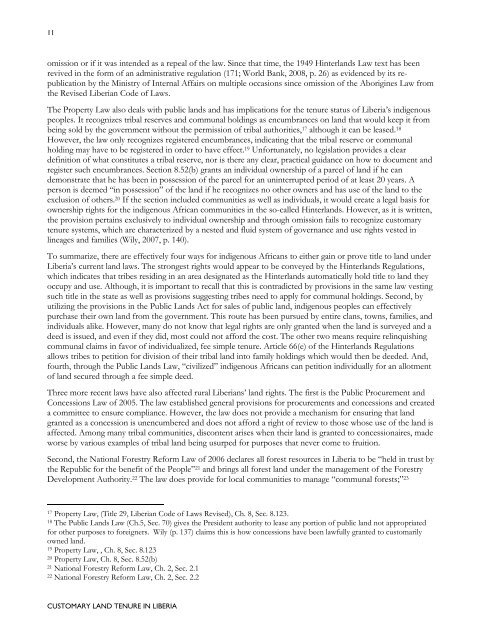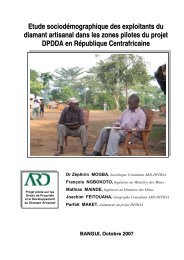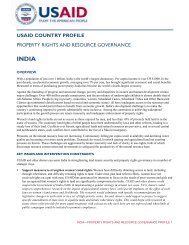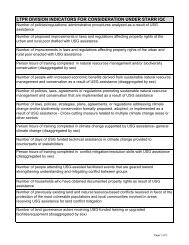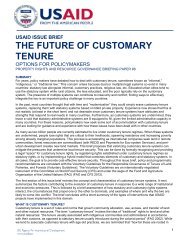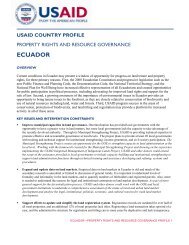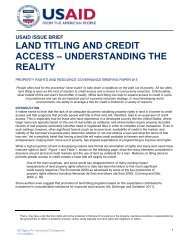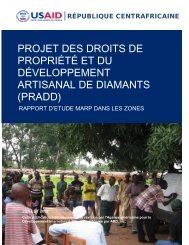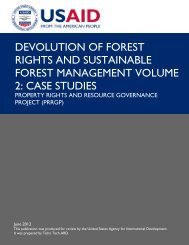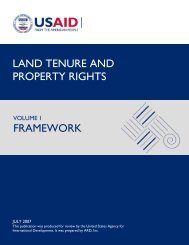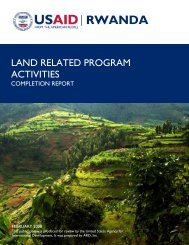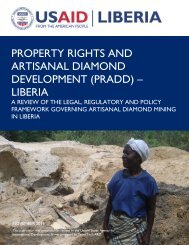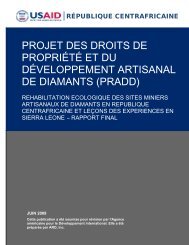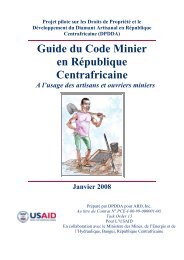Customary Land Tenure in Liberia - Land Tenure and Property ...
Customary Land Tenure in Liberia - Land Tenure and Property ...
Customary Land Tenure in Liberia - Land Tenure and Property ...
You also want an ePaper? Increase the reach of your titles
YUMPU automatically turns print PDFs into web optimized ePapers that Google loves.
11<br />
omission or if it was <strong>in</strong>tended as a repeal of the law. S<strong>in</strong>ce that time, the 1949 H<strong>in</strong>terl<strong>and</strong>s Law text has been<br />
revived <strong>in</strong> the form of an adm<strong>in</strong>istrative regulation (171; World Bank, 2008, p. 26) as evidenced by its republication<br />
by the M<strong>in</strong>istry of Internal Affairs on multiple occasions s<strong>in</strong>ce omission of the Aborig<strong>in</strong>es Law from<br />
the Revised <strong>Liberia</strong>n Code of Laws.<br />
The <strong>Property</strong> Law also deals with public l<strong>and</strong>s <strong>and</strong> has implications for the tenure status of <strong>Liberia</strong>‟s <strong>in</strong>digenous<br />
peoples. It recognizes tribal reserves <strong>and</strong> communal hold<strong>in</strong>gs as encumbrances on l<strong>and</strong> that would keep it from<br />
be<strong>in</strong>g sold by the government without the permission of tribal authorities, 17 although it can be leased. 18<br />
However, the law only recognizes registered encumbrances, <strong>in</strong>dicat<strong>in</strong>g that the tribal reserve or communal<br />
hold<strong>in</strong>g may have to be registered <strong>in</strong> order to have effect. 19 Unfortunately, no legislation provides a clear<br />
def<strong>in</strong>ition of what constitutes a tribal reserve, nor is there any clear, practical guidance on how to document <strong>and</strong><br />
register such encumbrances. Section 8.52(b) grants an <strong>in</strong>dividual ownership of a parcel of l<strong>and</strong> if he can<br />
demonstrate that he has been <strong>in</strong> possession of the parcel for an un<strong>in</strong>terrupted period of at least 20 years. A<br />
person is deemed “<strong>in</strong> possession” of the l<strong>and</strong> if he recognizes no other owners <strong>and</strong> has use of the l<strong>and</strong> to the<br />
exclusion of others. 20 If the section <strong>in</strong>cluded communities as well as <strong>in</strong>dividuals, it would create a legal basis for<br />
ownership rights for the <strong>in</strong>digenous African communities <strong>in</strong> the so-called H<strong>in</strong>terl<strong>and</strong>s. However, as it is written,<br />
the provision perta<strong>in</strong>s exclusively to <strong>in</strong>dividual ownership <strong>and</strong> through omission fails to recognize customary<br />
tenure systems, which are characterized by a nested <strong>and</strong> fluid system of governance <strong>and</strong> use rights vested <strong>in</strong><br />
l<strong>in</strong>eages <strong>and</strong> families (Wily, 2007, p. 140).<br />
To summarize, there are effectively four ways for <strong>in</strong>digenous Africans to either ga<strong>in</strong> or prove title to l<strong>and</strong> under<br />
<strong>Liberia</strong>‟s current l<strong>and</strong> laws. The strongest rights would appear to be conveyed by the H<strong>in</strong>terl<strong>and</strong>s Regulations,<br />
which <strong>in</strong>dicates that tribes resid<strong>in</strong>g <strong>in</strong> an area designated as the H<strong>in</strong>terl<strong>and</strong>s automatically hold title to l<strong>and</strong> they<br />
occupy <strong>and</strong> use. Although, it is important to recall that this is contradicted by provisions <strong>in</strong> the same law vest<strong>in</strong>g<br />
such title <strong>in</strong> the state as well as provisions suggest<strong>in</strong>g tribes need to apply for communal hold<strong>in</strong>gs. Second, by<br />
utiliz<strong>in</strong>g the provisions <strong>in</strong> the Public <strong>L<strong>and</strong></strong>s Act for sales of public l<strong>and</strong>, <strong>in</strong>digenous peoples can effectively<br />
purchase their own l<strong>and</strong> from the government. This route has been pursued by entire clans, towns, families, <strong>and</strong><br />
<strong>in</strong>dividuals alike. However, many do not know that legal rights are only granted when the l<strong>and</strong> is surveyed <strong>and</strong> a<br />
deed is issued, <strong>and</strong> even if they did, most could not afford the cost. The other two means require rel<strong>in</strong>quish<strong>in</strong>g<br />
communal claims <strong>in</strong> favor of <strong>in</strong>dividualized, fee simple tenure. Article 66(e) of the H<strong>in</strong>terl<strong>and</strong>s Regulations<br />
allows tribes to petition for division of their tribal l<strong>and</strong> <strong>in</strong>to family hold<strong>in</strong>gs which would then be deeded. And,<br />
fourth, through the Public <strong>L<strong>and</strong></strong>s Law, “civilized” <strong>in</strong>digenous Africans can petition <strong>in</strong>dividually for an allotment<br />
of l<strong>and</strong> secured through a fee simple deed.<br />
Three more recent laws have also affected rural <strong>Liberia</strong>ns‟ l<strong>and</strong> rights. The first is the Public Procurement <strong>and</strong><br />
Concessions Law of 2005. The law established general provisions for procurements <strong>and</strong> concessions <strong>and</strong> created<br />
a committee to ensure compliance. However, the law does not provide a mechanism for ensur<strong>in</strong>g that l<strong>and</strong><br />
granted as a concession is unencumbered <strong>and</strong> does not afford a right of review to those whose use of the l<strong>and</strong> is<br />
affected. Among many tribal communities, discontent arises when their l<strong>and</strong> is granted to concessionaires, made<br />
worse by various examples of tribal l<strong>and</strong> be<strong>in</strong>g usurped for purposes that never come to fruition.<br />
Second, the National Forestry Reform Law of 2006 declares all forest resources <strong>in</strong> <strong>Liberia</strong> to be “held <strong>in</strong> trust by<br />
the Republic for the benefit of the People” 21 <strong>and</strong> br<strong>in</strong>gs all forest l<strong>and</strong> under the management of the Forestry<br />
Development Authority. 22 The law does provide for local communities to manage “communal forests;” 23<br />
17 <strong>Property</strong> Law, (Title 29, <strong>Liberia</strong>n Code of Laws Revised), Ch. 8, Sec. 8.123.<br />
18 The Public <strong>L<strong>and</strong></strong>s Law (Ch.5, Sec. 70) gives the President authority to lease any portion of public l<strong>and</strong> not appropriated<br />
for other purposes to foreigners. Wily (p. 137) claims this is how concessions have been lawfully granted to customarily<br />
owned l<strong>and</strong>.<br />
19 <strong>Property</strong> Law, , Ch. 8, Sec. 8.123<br />
20 <strong>Property</strong> Law, Ch. 8, Sec. 8.52(b)<br />
21 National Forestry Reform Law, Ch. 2, Sec. 2.1<br />
22 National Forestry Reform Law, Ch. 2, Sec. 2.2<br />
CUSTOMARY LAND TENURE IN LIBERIA


